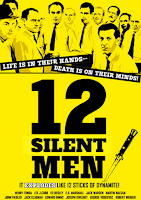12 Silent Men - Purity In Cinema
Quick Thoughts: 12 Silent Men (2016)
A new look at a classic movie.
12 Silent Men is a brilliant short film that extracts and cuts together all of the moments of silence in the classic, highly verbose film, 12 Angry Men. This is quite clearly, and as the filmmakers suggest, supposed to ask a question concerning pure cinema. This is an old idea that was a response to the coming of sound films, one that suggested that sound ruined the cinematic nature of films, reducing them to stage plays. It was figures such as Hitchcock who would focus on retaining the spirit of silent cinema in his sound films who really lauded this idea. Nonetheless, talkative talking pictures have always remained and have proven themselves, certainly in my view, many times over. From His Girl Friday to Whose Afraid Of Virginia Woolf? to Before Sunrise we see a history of chatty cinema stand up for itself as, maybe not pure cinema, but a cinema nonetheless. 12 Angry Men is certainly a masterpiece in this genre. The most rewarding element of this short that disregards its chatty nature is not that it makes this a pure film, but that it highlights what is already pure within it, which proves that, as dialogue heavy as a film gets, silence is still incredibly relevant.
Before I leave you with the short, I can't say what this would appear to be if you haven't actually seen 12 Angry Men. It does seem, however, that if you've seen the original film beforehand that this all makes perfect sense. The dialogue and its role as characterisation in 12 Angry Men then remain pertinent despite that fact that they're not present here. So, as suggested, this isn't really about pure cinema alone, instead, it emphasises pure cinema in a chatty film, giving 12 Angry Men a new face and leaving you with a new appreciation of it.
A new look at a classic movie.
12 Silent Men is a brilliant short film that extracts and cuts together all of the moments of silence in the classic, highly verbose film, 12 Angry Men. This is quite clearly, and as the filmmakers suggest, supposed to ask a question concerning pure cinema. This is an old idea that was a response to the coming of sound films, one that suggested that sound ruined the cinematic nature of films, reducing them to stage plays. It was figures such as Hitchcock who would focus on retaining the spirit of silent cinema in his sound films who really lauded this idea. Nonetheless, talkative talking pictures have always remained and have proven themselves, certainly in my view, many times over. From His Girl Friday to Whose Afraid Of Virginia Woolf? to Before Sunrise we see a history of chatty cinema stand up for itself as, maybe not pure cinema, but a cinema nonetheless. 12 Angry Men is certainly a masterpiece in this genre. The most rewarding element of this short that disregards its chatty nature is not that it makes this a pure film, but that it highlights what is already pure within it, which proves that, as dialogue heavy as a film gets, silence is still incredibly relevant.
Before I leave you with the short, I can't say what this would appear to be if you haven't actually seen 12 Angry Men. It does seem, however, that if you've seen the original film beforehand that this all makes perfect sense. The dialogue and its role as characterisation in 12 Angry Men then remain pertinent despite that fact that they're not present here. So, as suggested, this isn't really about pure cinema alone, instead, it emphasises pure cinema in a chatty film, giving 12 Angry Men a new face and leaving you with a new appreciation of it.
Previous post:
More from me:










